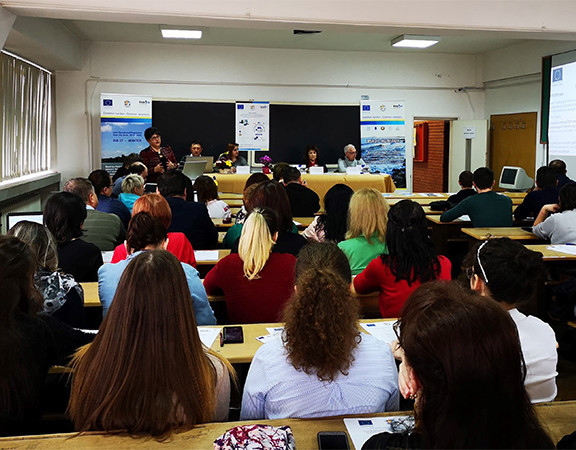- expert training with the topics: investigation of metals (including Hg), radioisotopes, nutrients, pharmaceuticals and endocrine disruptors in environmental components (water, sediment, soils, aquatic organisms);
- working visit for field and laboratory monitoring of environmental radioisotopes with the updated nuclear equipment.
The project is financed by the European Union through European Neighborhood Instrument (ENI) - Cross-border cooperation (CBC) - in the frame of the Joint Operational Programme BLACK SEA BASIN 2014-2020, Priority 2 – Promote coordination of environmental protection and joint reduction of marine litter in the Black Sea Basin, Specific Objective 2.1 – Improve joint environmental monitoring, and has an implementation period of 30 months (20.09.2018-19.03.2021). The total budget of the project is 952,583.55 EURO, out of which 876,576.85 EURO is the contribution of European Union.
The main themes debated at the high level training event were: Presentation of the project objectives, target toxicants and expected results; Radioisotopes – sources, detection methods and level of radioactivity concentration and gamma ambiental doses în Black Sea Basin target areas; Pharmaceutical Emerging Contaminants - Aquatic Pollution and Ecotoxicological Effects; Radiopharmaceuticals. Predictable perspectives and hidden dangers; Nuclear radiations dosimetry; Evaluation of impact of radioactive content of drinkable water on people’s health.
Parallel visits at interdisciplinary research laboratories and field measurements comprised:
I. High resolution gamma ray spectroscopy and alpha spectroscopy for the analysis of radionuclides in environmental samples, and indoor radon & thoron;
II. Training for microbiological evaluations and application of HPLC technique for the determination of pharmaceuticals and endocrine disruptors;
III. Laboratory training for AAS technique – determination of heavy metals and trace elements;
IV. Molecular spectroscopy methods for the analysis of nutrients, mineralogical constituents, microplastics: UV-VIS, FTIR, ATR-FTIR;
V. X-ray based investigation methods: X-ray fluorescence (XRF), Scanning electron microscopy (SEM) with Energy-Dispersive X-ray Analysis (SEM-EDX);
VI. Field training for professionals and students - measurements of gamma radiation dose rates.
At the event participated the Project Manager, Prof.dr.habil. Antoaneta Ene and key staff members from "Dunarea de Jos" University of Galati and INPOLDE reseach center, and from project partner institutions in Romania, Republic of Moldova and Greece: Institute of Zoology (deputy coordinator Dr. Lucia Biletchi), International Hellenic University, Kavala, Greece (coordinator Prof.dr. Thomas Spanos); Institute of Geology and Seismology, Chisinau (coordinator Dr. Oleg Bogdevich) and Danube Delta National Institute for Research and Development, Tulcea (coordinator Dr. Liliana Teodorof).
The activities gathered a large number of representatives of target groups: members of the project research teams, academic staff, researchers, technicians, undergraduate students (from Environmental Science, Medicine and Pharmacy, Food Science and Engineering), PhD and master students, experts in environmental and health issues, as well as high school teachers and students (https://www.facebook.com/Monitox.project.BSB27/posts/503572256891440).
The full agenda of the training session is found by accessing the link:
https://www.facebook.com/Monitox.project.BSB27/posts/502028163712516



